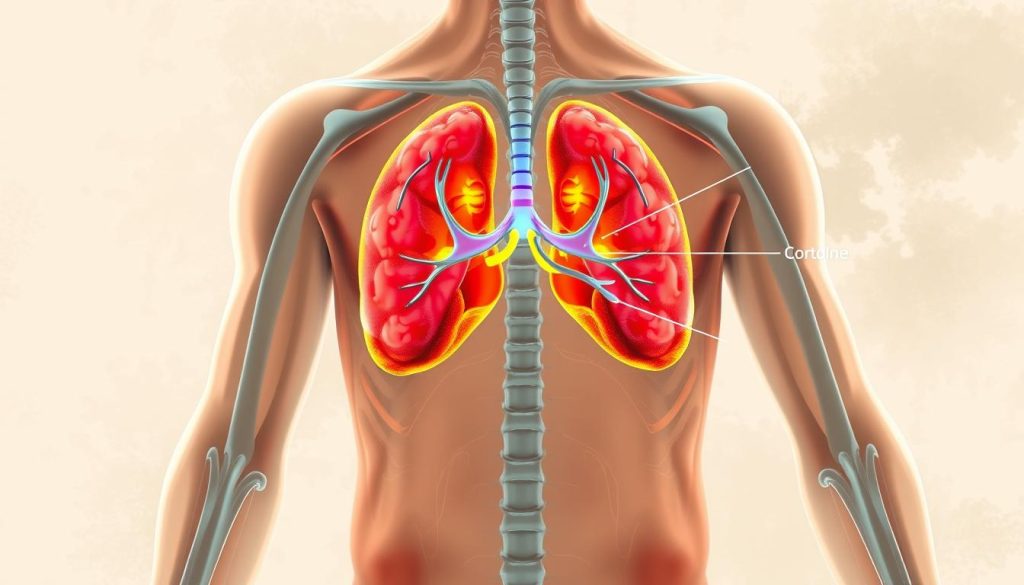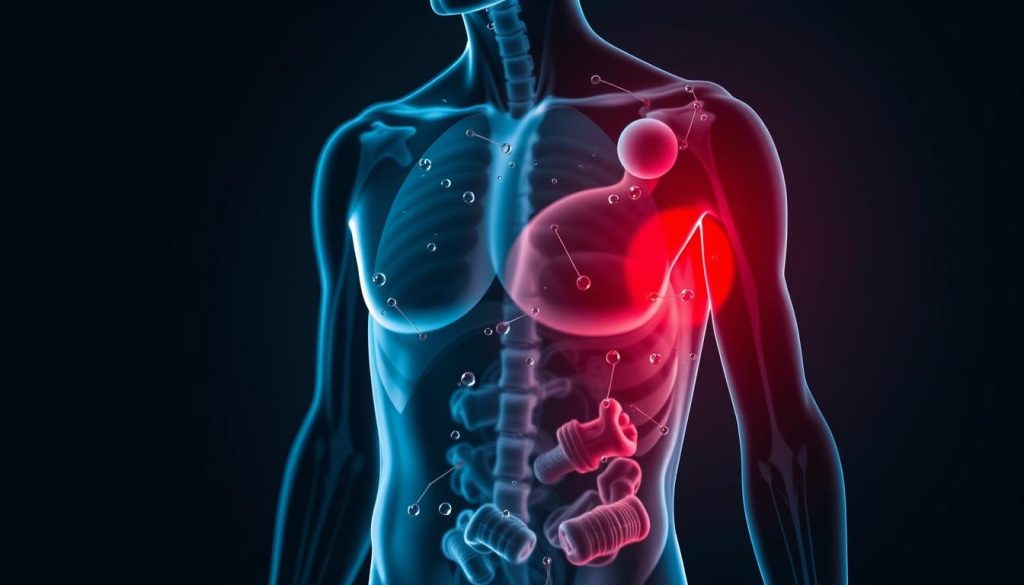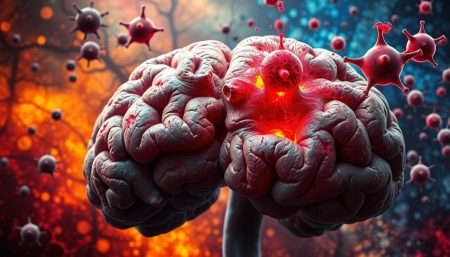Addison’s disease is a serious condition where the adrenal glands don’t make enough hormones. These hormones, cortisol and aldosterone, are key for many body functions. Without them, people can face many addison’s disease symptoms. Knowing the adrenal insufficiency signs helps get medical help fast.
This early action is crucial for managing the disease well. Our mission is to help people understand and deal with health issues, especially those related to the endocrine system.
Learning about Addison’s disease starts with knowing the symptoms and early detection. This knowledge helps both individuals and doctors create good treatment plans. By starting to learn about it, people take a big step towards a healthier life with Addison’s disease.
Key Takeaways
- Recognizing early addison’s disease symptoms is key for timely treatment.
- Knowing adrenal insufficiency signs can lead to better health outcomes.
- Cortisol and aldosterone shortages are at the heart of the disease, making it important to watch for symptoms.
- Understanding symptoms helps in talking better with doctors.
- Spotting symptoms early is vital for managing Addison’s disease well.
Understanding Addison’s Disease and Adrenal Insufficiency
Addison’s Disease is a serious condition where the body can’t make enough hormones. It affects the health by not producing enough cortisol and aldosterone. These hormones are key for keeping the body working right.
What Is Addison’s Disease?
Addison’s Disease happens when the adrenal glands can’t make enough hormones. These hormones, like cortisol and aldosterone, are vital. They help control how the body uses energy, blood pressure, and how it handles stress.
How Adrenal Insufficiency Relates to Addison’s
Adrenal insufficiency is a broader term that includes Addison’s Disease. All Addison’s cases are a type of adrenal insufficiency. But, not all adrenal insufficiencies are Addison’s Disease. Addison’s is often caused by the body attacking its own adrenal glands.
The Role of Cortisol and Aldosterone in Your Body
Cortisol helps the body deal with stress and use food. Without enough, you might feel tired, lose weight, and get weak. Aldosterone helps control sodium and water levels, which is important for blood pressure. Without enough, you could get dehydrated and have low blood pressure.

Knowing how cortisol and aldosterone work is key to managing Addison’s Disease. These hormones are crucial for a good quality of life. Doctors can help by checking hormone levels and finding the right treatments.
Identifying Addison’s Disease Symptoms
Understanding diagnosing Addison’s disease starts with knowing the hypoadrenalism symptoms. These signs can be hard to spot and vary a lot. It’s key to notice the small changes in your body. Spotting these symptoms early helps get the right treatment fast.

To start diagnosing Addison’s disease, know the common signs of adrenal insufficiency. These signs can look like other health issues, making it tricky to figure out what’s wrong. Knowing the hypoadrenalism symptoms helps both patients and doctors.
- Chronic fatigue not relieved by sleep
- Muscle weakness or unexplained muscle pain
- Weight loss and decreased appetite
- Low blood pressure that may cause dizziness or fainting
- Skin changes, such as darker skin on scars and skin folds
- Cravings for salt or salty foods
- Gastrointestinal disturbances like nausea, diarrhea, or vomiting
- Irritability and depression
Spotting these symptoms early is crucial for diagnosing Addison’s disease. Since many symptoms are common, keeping a record of when they happen is helpful. Talking to a doctor about these signs can lead to the right diagnosis. It’s important to know the signs of Addison’s Disease to stay healthy.
| Symptom | Commonality in Addison’s Disease | Common in Other Conditions |
|---|---|---|
| Chronic Fatigue | Very Common | Common |
| Muscle Weakness | Common | Less Common |
| Gastrointestinal Issues | Common | Common |
| Low Blood Pressure | Very Common | Less Common |
| Skin Darkening | Common | Rare |
| Salt Cravings | Less Common | Rare |
| Irritability | Common | Very Common |
This table shows how hypoadrenalism symptoms in Addison’s disease compare to other health issues. Knowing these differences is key for both patients and doctors in diagnosing Addison’s disease.
Early Signs of Cortisol Deficiency Indicators
It’s important to know the early signs of cortisol deficiency symptoms to catch adrenal insufficiency early. This part talks about the first, subtle signs that might mean you need to see a doctor.
Subtle Symptoms to Be Aware Of
The first signs of cortisol deficiency are often missed. Feeling tired might seem like just being busy, and small skin changes might not worry you. But catching these signs early can help you take care of yourself sooner.
- Persistent tiredness not alleviated by sleep
- Muscle weakness with no apparent cause
- Low blood pressure leading to dizziness
- Weight loss that isn’t linked to diet changes
- Slight skin darkening (hyperpigmentation) in unexposed areas
Awareness and Monitoring of Early Indicators
Keeping a symptom diary can help track signs of adrenal insufficiency. Writing down daily changes and symptoms can give doctors important clues, helping them diagnose faster.
Knowing about cortisol deficiency symptoms helps you get medical help on time. Here are some ways to keep an eye on your health:
- Document symptoms and noticeable health shifts daily.
- Seek regular medical check-ups, especially if you observe persistent symptoms.
- Educate yourself about adrenal health to better understand body signals.

The Impact of Low Aldosterone Effects on the Body
Aldosterone is a key hormone that helps control blood pressure and keeps sodium and potassium levels balanced. When aldosterone levels are low, low aldosterone symptoms appear, affecting health greatly.
Effects of adrenal hormone imbalance from low aldosterone can harm in many ways. It disrupts blood pressure and fluid balance, causing physical symptoms and health problems.
- Decreased blood pressure
- Heightened salt cravings
- Frequent urination and excessive thirst
- Muscle cramps
It’s important to know these symptoms early to manage the hormonal imbalance. If you notice any of these signs, especially together, see a doctor right away.

| Symptom | Potential Complications |
|---|---|
| Decreased blood pressure | Increased risk of shock |
| Salt cravings | Imbalance in electrolyte levels |
| Frequent urination and thirst | Dehydration, renal problems |
| Muscle cramps | Reduced muscle function, increased injury risk |
Knowing and dealing with effects of adrenal hormone imbalance can greatly improve life quality. Treatment often includes hormone replacement and lifestyle changes to balance hormone levels and reduce symptoms.
Why Fatigue Is a Common Cause of Concern
Fatigue, or chronic tiredness, is a big worry for those with Addison’s Disease. We’ll look at how adrenal health affects energy levels. This includes both physical and mental sides.
Chronic Tiredness and Addison’s Disease
Feeling tired all the time is more than just wanting to sleep. It’s a deep tiredness that makes everyday tasks hard. This happens because the adrenal glands don’t make enough cortisol and aldosterone. These hormones are key for keeping energy up.
Understanding the Link Between Fatigue and Adrenal Health
Adrenal health is key to managing energy in our bodies. When the adrenals don’t work right, it leads to fatigue. Knowing this helps us better treat Addison’s Disease.
| Factor | Impact on Adrenal Health | Resulting Effect on Energy Levels |
|---|---|---|
| Cortisol Deficiency | High | Severely reduced stamina and alertness |
| Aldosterone Shortfall | Moderate to High | Fluctuations in electrolyte balance, affecting muscle function |
| ACTH Production | Variable | Inconsistent energy peaks and troughs |
What Muscle Weakness Reveals About Addison’s Disease
Understanding muscle weakness in Addison’s Disease is key to managing health. This symptom can be both telling and challenging.
Reasons Behind Progressive Muscle Fatigue
One main muscle weakness reason in Addison’s is low cortisol and aldosterone. These hormones are crucial for muscle strength and endurance. Muscle fatigue in Addison’s can make daily life harder, lowering quality of life.
Addison’s disease affects the body’s stress management and muscle repair. Cortisol helps with metabolism, giving muscles the energy they need. Without enough, muscles weaken and fatigue.
Navigating Muscle Weakness with Addison’s Disease
To tackle progressive muscle fatigue in Addison’s, several steps are needed:
- Regular check-ups with healthcare providers to adjust hormone therapy.
- Eating a balanced diet with proteins and nutrients for muscle repair and energy.
- Doing light to moderate exercise as advised by health professionals to build muscle without overdoing it.
Also, learning to spot early signs of muscle weakness can help adjust treatment early. This can prevent severe episodes.
Diagnosing Low Blood Pressure Symptoms and Their Causes
Understanding low blood pressure symptoms is key. They can point to serious issues like adrenal insufficiency. Getting a correct adrenal insufficiency diagnosis is vital for treatment.
Low blood pressure symptoms can be tricky to spot. But, they can lead to big health problems if not caught early. Signs like dizziness, tiredness, and blurry vision need a doctor’s check-up. They might be linked to adrenal insufficiency.
| Low Blood Pressure Symptom | Possible Causes | Relevance to Adrenal Insufficiency |
|---|---|---|
| Dizziness | Decreased blood volume, heart problems | Often directly associated with adrenal insufficiency |
| Fatigue | Insufficient blood flow to organs | Can be exacerbated by low cortisol levels |
| Blurred vision | Reduced blood supply to the optic system | Less common but possible in severe cases |
When low blood pressure symptoms show up, doctors run tests to check for adrenal insufficiency diagnosis. They use blood tests, imaging, and special tests to see how the adrenals are working. This shows how important a detailed check-up is.
Doctors help patients through the testing process. They stress the need to spot low blood pressure symptoms early. This helps get a quick adrenal insufficiency diagnosis and better care.
“Understanding the relationship between low blood pressure and adrenal insufficiency can significantly improve patient care.”
In short, even small signs like tiredness or dizziness can be important. They help doctors figure out what’s going on and how to treat it. Quick action and care are key in managing these serious conditions.
Nausea and Vomiting Causes in Adrenal Insufficiency
It’s important to know about the stomach problems linked to adrenal insufficiency, like nausea and vomiting. These signs can point to an adrenal crisis. They show why it’s key to spot them early in Addison’s disease.
How Gastrointestinal Symptoms Correlate with Addison’s
Adrenal insufficiency means less cortisol, which affects the stomach. The drop in cortisol is a main nausea and vomiting cause. Cortisol helps control many body functions, including inflammation and how food moves through the stomach.
Recognizing Gastrointestinal Distress as Addisonian Crisis
Nausea and vomiting can be signs of an Addisonian crisis. This is a serious situation that needs quick medical help. These adrenal crisis symptoms are a warning to act fast to avoid worse problems.
Learning more about Addison’s disease helps diagnose and manage symptoms better. This knowledge is crucial for treating adrenal insufficiency effectively.
Conclusion
Starting to understand Addison’s disease can feel daunting. Yet, it’s crucial to spot its symptoms early. Signs like low cortisol, aldosterone, fatigue, muscle weakness, and blood pressure issues are key. They signal the need for a timely diagnosis and effective management.
Living with Addison’s disease requires more than just medical care. It also needs a supportive community and resources. Our goal is to help patients and their families face health challenges with confidence. We aim for a personalized approach that respects each person’s unique path.
We hope the information here helps those affected by Addison’s disease. The journey to wellness is not alone. With the right medical info and stories of resilience, we’re here to support and educate. By raising awareness, we celebrate the power of knowledge and community in health and healing.
FAQ
Q: What Are the Signs and Symptoms of Addison’s Disease?
A: Symptoms of Addison’s disease include chronic fatigue and muscle weakness. Low blood pressure and weight loss are also common. Skin discoloration, salt cravings, and stomach issues like nausea and vomiting can occur too. Recognizing these symptoms early is crucial for treatment.
Q: How Does Adrenal Insufficiency Relate to Addison’s Disease?
A: Addison’s disease is a type of adrenal insufficiency. This term refers to conditions where the body doesn’t make enough adrenal hormones. Addison’s specifically happens when the adrenal glands are damaged.
Q: Why Are Cortisol and Aldosterone Important for the Body?
A: Cortisol helps the body handle stress and keep blood sugar levels stable. It also fights infections. Aldosterone, on the other hand, controls blood pressure and balances sodium and potassium. Without enough of these hormones, health problems can arise.
Q: What Are the Early Signs of Cortisol Deficiency?
A: Early signs of cortisol deficiency include feeling tired and weak. These symptoms are subtle but important. They should prompt you to check your health and talk to a doctor.
Q: What Effects Does Low Aldosterone Have on the Body?
A: Low aldosterone can cause dehydration and low blood pressure. It also leads to salt cravings and imbalances in electrolytes. Aldosterone is key for managing sodium and potassium levels and blood pressure.
Q: How Does Addison’s Disease Cause Fatigue?
A: Addison’s disease lowers cortisol levels, which are vital for energy and metabolism. Without enough cortisol, the body can’t keep up energy, causing chronic fatigue.
Q: Why Does Addison’s Disease Lead to Muscle Weakness?
A: Muscle weakness in Addison’s disease comes from low sodium and high potassium levels. These imbalances, caused by low aldosterone, affect muscle function.
Q: How Is Low Blood Pressure Linked to Adrenal Insufficiency?
A: Adrenal insufficiency, like Addison’s disease, can lower aldosterone levels. This causes the kidneys to lose too much sodium, leading to low blood volume and hypotension.
Q: Can Nausea and Vomiting Be a Sign of Adrenal Insufficiency?
A: Yes, nausea and vomiting can be signs of adrenal insufficiency. They may indicate an Addisonian crisis, especially with severe weakness, pain, and low blood pressure.
Q: What Causes Skin Discoloration in Addison’s Disease?
A: Skin discoloration in Addison’s disease is due to increased melanocyte-stimulating hormone (MSH). This happens when the body tries to compensate for low cortisol levels. The discoloration appears on sun-exposed areas, joints, and areas with friction like elbows and knees.


















